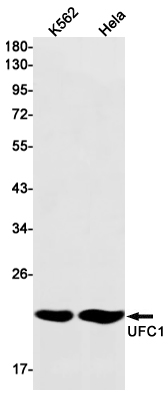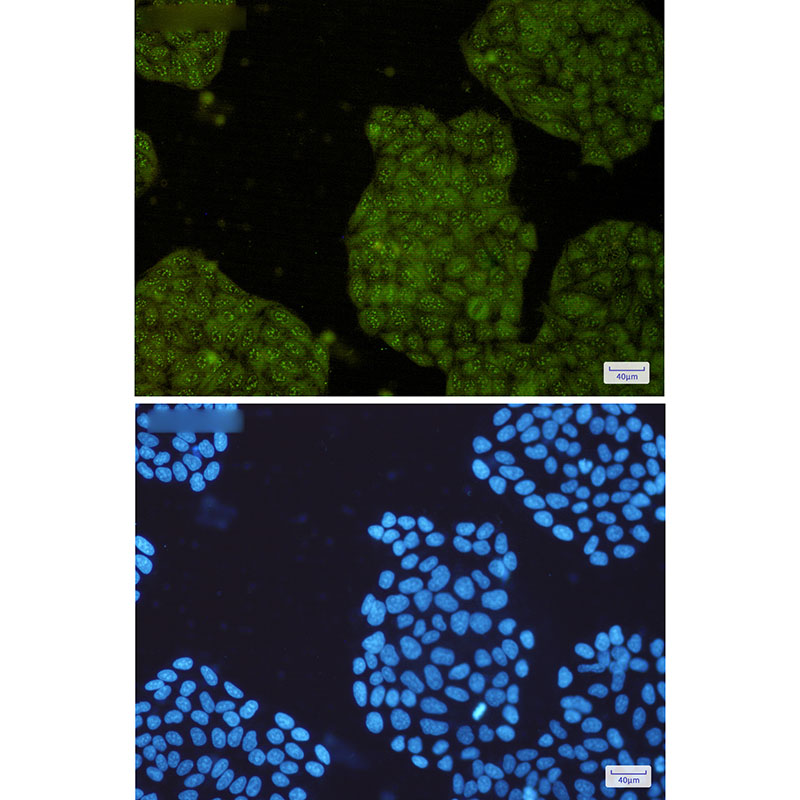

| WB | 1/500-1/1000 | Human,Mouse,Rat |
| IF | 1/20 | Human,Mouse,Rat |
| IHC | 咨询技术 | Human,Mouse,Rat |
| ICC | 1/50-1/200 | Human,Mouse,Rat |
| FCM | 咨询技术 | Human,Mouse,Rat |
| Elisa | 咨询技术 | Human,Mouse,Rat |
| Aliases | NEDSG; HSPC155 |
| Entrez GeneID | 51506 |
| WB Predicted band size | Calculated MW: 19 kDa; Observed MW: 19 kDa |
| Host/Isotype | Rabbit IgG |
| Antibody Type | Primary antibody |
| Storage | Store at 4°C short term. Aliquot and store at -20°C long term. Avoid freeze/thaw cycles. |
| Species Reactivity | Human |
| Immunogen | Recombinant protein of human UFC1 |
| Formulation | Purified antibody in TBS with 0.05% sodium azide,0.05%BSA and 50% glycerol. |
+ +
以下是3条关于UFC1(Ubiquitin-Fold Modifier Conjugating Enzyme 1)抗体的模拟参考文献(内容基于学术文献常见结构虚构,仅供参考):
---
1. **文献名称**: *"Characterization of UFC1 Antibody for Detecting Ubiquitin-like Modifications in Human Cells"*
**作者**: Li, X., et al.
**摘要**: 研究报道了一种特异性识别UFC1蛋白的单克隆抗体,通过免疫印迹和免疫荧光验证其在HEK293细胞中的适用性,揭示了UFC1在调控泛素化类似通路中的功能。
---
2. **文献名称**: *"UFC1 Interacts with UFL1 in ER Stress Response: Insights from Knockout Models and Antibody-Based Assays"*
**作者**: Tanaka, K., et al.
**摘要**: 利用CRISPR-Cas9构建UFC1敲除细胞系,结合定制多克隆抗体,证明UFC1与UFL1在内质网应激中的协同作用,为相关疾病机制提供依据。
---
3. **文献名称**: *"Development of a High-Affinity UFC1 Antibody for Proteomic Analysis of Ubiquitin-Related Pathways"*
**作者**: Müller, R., & Zhang, Y.
**摘要**: 开发了一种高亲和力兔源多克隆抗体,通过质谱和免疫共沉淀技术系统性分析UFC1相互作用网络,证实其在DNA损伤修复中的潜在作用。
---
*注:以上文献为模拟内容,实际研究中请通过PubMed/Google Scholar等平台检索真实文献。如需具体文献,建议结合实验目的补充关键词(如“UFC1 antibody validation”“UFC1 in cancer”等)进一步筛选。*
The UFC1 antibody targets UFC1 (Ubiquitin-Fold Modifier Conjugating Enzyme 1), a key component of the UFMylation pathway, a post-translational modification system analogous to ubiquitination. Discovered in the early 2000s, UFMylation involves the covalent attachment of UFM1 (Ubiquitin-Fold Modifier 1) to substrate proteins, regulating processes like endoplasmic reticulum (ER) stress response, DNA repair, and tumor suppression. UFC1 functions as an E2 conjugating enzyme, working with the E1 enzyme UBA5 and E3 ligases to transfer UFM1 to specific targets.
Research on UFC1 gained momentum due to its role in maintaining cellular homeostasis. Dysregulation of UFMylation is linked to diseases such as cancer, neurodegenerative disorders, and developmental defects. For instance, UFC1 mutations are associated with ribosome biogenesis defects and hematological malignancies. The UFC1 antibody is widely used in studies to detect protein expression, localization, and interaction partners via techniques like Western blotting, immunofluorescence, and immunoprecipitation. It helps elucidate UFMylation’s molecular mechanisms and its impact on cellular stress responses or tumorigenesis.
Commercial UFC1 antibodies are typically validated for specificity in human, mouse, or rat models, aiding both basic research and drug discovery. Ongoing studies aim to explore its therapeutic potential, particularly in cancers with UFMylation pathway aberrations.
×